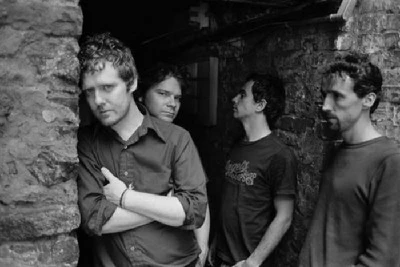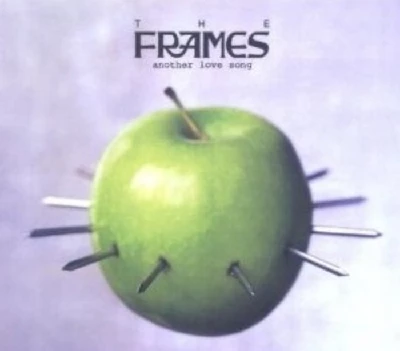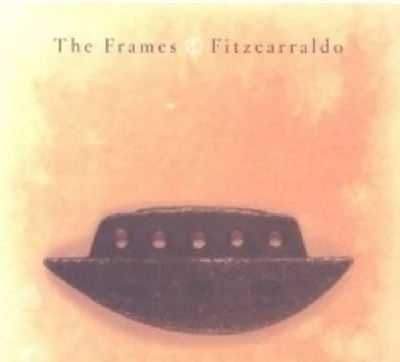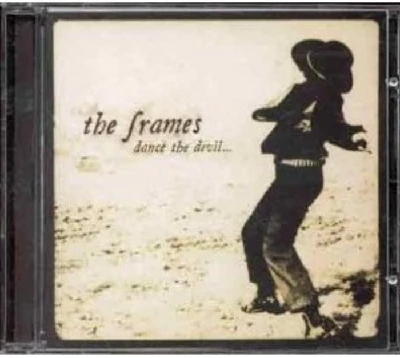published: 29 /
7 /
2010

Ben Howarth examines the early history of Irish rock band the Frames, who have just had their first three albums, 'Another Love Song', 'Fitzcarraldo', and 'Dance the Devil', reissued on CD in expanded editions
Article
Comparing the work short and scruffy jeans, the battered guitar and tatty beanie hat that Glen Hansard tended to wear on tour the last time the Frames toured in 2007 with the band photograph on the cover of their debut, 1991's 'Another Love Song', is a real surprise. An odd looking ragbag, who don’t seem to be able to decide if they are glam rockers or grungers, this picture shows that the unaffected, unadorned approach which makes Hansard and his band sound unique was actually something that he had to learn over time.
Only one of Hansard’s band mates survives in the current version of the Frames - Colm Mac Con Iomaire, whose violin gives a distinctive air to songwriting that hasn’t quite developed its own personality. One of those fallen bandmates was bassist John Carney, who would crop up again in the Frames’ story when he offered Hansard the lead role in his musical film ‘Once’, earning Hansard an Oscar and a surprise shot at a fame that seemed to have eluded him.
The album bursts off with ‘The Dancer’, one of the band’s chirpiest songs, but quickly settles into the style that would suit the Frames well for much of their career - combining the stadium filling sounds of Pearl Jam and U2, the heart-on-sleeve emotions of Counting Crows, the homespun mysticism of Cat Stevens with the otherworldliness of early REM.
Alas, at this stage, the songwriting didn’t do enough to make the Frames stand out. Hansard admitted as much in an interview a decade later, when he conceded that his desire for a record deal made him compromise. Instead of reproducing the folk songs he grew up busking around Dublin, he attempted to make a rock album, but accepts now that he didn’t really know how to write rock songs.
And yet, devoted fans of the Frames will find this fascinating, with just enough hints of greatness to come. ‘The Waltz’ - a fairly simple ballad - benefits immensely from the influence of Irish folk music, while ‘Downhill From Hill’ is the kind of brooding ballad that the Frames would soon become masters of. On this album, Hansard shows the fearless qualities as a performer, which only needed to be allied with improved song craft to give the Frames their big leap forward.
By the time he came to record in 1995 his band’s next album, 'Fitzcarraldo', Hansard had lost most of his bandmates and his label (moving from major label Universal to Trevor Horn’s ZTT), but had also appeared in a smash hit film, taking the part of the guitarist in 'The Commitments'.
Anyone witnessing the Frames live show in 1995 would have witnessed clear signs of the big leap forward that allowed Glen Hansard to find his own voice. Hansard had tasted success as an actor, but failure as a musician, yet it was music to which he returned in spite. Confirmation that his passion for music counted for more than hopes of fame came with the songs that would remain the stand-out moments of any live performance featuring Glen Hansard a decade and a half later.
‘Revelate’, a punchy rock song; ‘Your Face’, a sweet nostalgic ballad; ‘Red Chord’, an epic prayer and the title track, ‘Fitzcarraldo’, a slow burning anthem - all these songs tug on the heartstrings and continue to be greeted by uniform rapture whenever aired in concert.
Unfortunately, the Frames’ were not lucky enough to be accepted on their own terms - and were still being nudged inelegantly towards the rock mainstream. Much of the production on the 1996 version of ‘Fitzcarraldo’ (the second stab the band had at recording and releasing these songs, having already recorded them once with Pete Briquette of the Boomtown Rats, and the version which has recently been re-released ) seems incongruous, with naïve attempts to recreate the guitar sound of Johnny Greenwood and the ambience of Massive Attack.
No better example of this comes on ‘Say It To Me Now’, which fans of Hansard’s 2006 film 'Once' will know as a gorgeous, simple acoustic ballad. They will be shocked by this version, which is simply smothered in unnecessary layers of tinny drum machines and electric guitar lines. Its too good a song to be completely ruined, but had songs like this been more sensitively handled, ‘Fitzcarraldo’ might have been acknowledged as a classic instead of just a cult favourite.
The band may not have fully realised the quality of these songs - even after two attempts - but taken together they still make for a compelling listen. The effect is not dissimilar from the Manic Street Preachers’ 'Gold Against the Soul', an album with readily apparent flaws, but taken in the context of what its creators would go on to achieve, can be seen to contain both the seeds of greatness and some soaring moments of its own.
Another commercial failure prompted another re-think and another change in personnel in time for 1999‘s ‘Dance the Devil‘. The band’s guitarist Dave Odlum took his place in the production chair (he was soon to leave the band and become a full time knob twiddler), and the band decided that it was time to bring their homespun, folky charm into the studio. Many of the songs feature just Hansard’s voice and guitar, with the barest of accompaniments. The Frames also found that they preferred experimenting with toy instruments and random instruments, and on the lullaby ‘Star Star’ and the lilting ‘Seven Day Mile’, they showed that they were best when they didn’t try and sound like other bands.
On top of this, Hansard had finally learned how to write rock songs, and with the soaring chorus, huge riff, ebbs and flows and big hearted sentiment of 'God Bless, Mom', he might have had a massive hit.
Unfortunately, label boss Trevor Horn insisted on producing this himself - but seems to had a mental aberration. Instead of giving the song a commercial sheen, he simply kills it. Where guitars should bite, he simply muffles them and where the chorus should soar, he turns everything down. From someone whose production skills are so revered (including by this reviewer, who is a big fan of ‘Video Killed the Radio Star’), it is an astonishingly poor effort, and sabotages what might otherwise have been the definitive Frames album.
The fact that the Frames chose to release their own versions of the songs Horn had produced showed just how differently the band and the label were thinking about how their music should be approached. The Frames were soon to leave ZTT, meaning that they no longer had to write songs aimed at radio play lists or endure incompetent production jobs. But they took the music with them.
In 2003, the songs from ‘Fitzcarraldo’ and ‘Dance the Devil’ combined on a live album, ‘Set List’, a soaring triumphant effort and a Number One in Ireland. Those are the definitive versions of the songs, as the band emerged triumphant with a home-made, self-financed album and proved that the commercial imperatives that had been imposed by their two labels had actually been stopping them achieve commercial success.
But, in the battle between artist and label, in the journey of a band realising what it wanted to be, in the loyalty of a fanbase that wouldn’t give up on a band who seemed to have no luck and in the great songwriting of Glen Hansard, these studio albums stand the test of time far better than anyone could have imagined at the time.
The success of the film ‘Once’ means that it makes sense for Hansard to have continued his onscreen partnership with co-star Marketa Irglova onstage, and his most recent album was recorded with Irglova, as ‘The Swell Season’, with his Frames' bandmates in tow. The Frames will, however, be returning to the stage for a series of ‘twentieth anniversary’ shows later this year. No doubt, it will be songs from ‘Dance the Devil’ and ‘Fitzcarraldo’ that get the biggest cheers.
Picture Gallery:-


